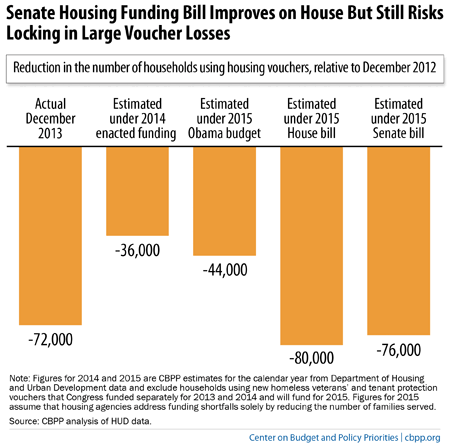BEYOND THE NUMBERS
Senate Housing Bill Improves on House But Still Risks Locking in Large Voucher Losses
The 2015 funding bill for the Departments of Transportation and Housing and Urban Development (HUD), which a Senate appropriations subcommittee approved yesterday, is a significant improvement over its House counterpart but still falls short in major respects.
As we’ve reported, the across-the-board sequestration cuts eliminated housing vouchers for some 70,000 low-income families in 2013. Congress provided enough funding in 2014 to restore roughly half of those lost vouchers.
But the 2015 spending bill that the House Appropriations Committee approved on May 21 would likely lock in the loss of more than 70,000 vouchers in 2015. It also makes significant cuts in other important low-income housing programs, such as in funding to repair public housing.
The Senate Appropriations Committee set better priorities, allocating $2.4 billion more for the Transportation-HUD bill than the House did, including roughly $1 billion more for HUD housing and community development programs. The Senate bill’s key areas of improvement over the House bill include:
- $6.38 billion for public housing operations and capital needs, $200 million more than the House bill and $100 million above the 2014 level. The Senate bill also raises to 185,000 the number of public housing units authorized to participate in the Rental Assistance Demonstration, a promising initiative that enables public housing agencies to obtain more private capital for repair needs. And it provides $90 million for the Choice Neighborhoods Initiative to revitalize public housing, other assisted housing, and surrounding distressed neighborhoods, $65 million more than the House bill.
- $2.15 billion for homeless assistance grants, $40 million above the House bill and the 2014 level.
- $950 million for the HOME Investment Partnerships program, which helps states and localities develop and preserve homes for lower-income owners and renters; that’s $250 million more than the House bill.
But, like the House bill, the Senate bill appears to provide enough funding to renew all vouchers in use this year only if housing agencies either don’t use their available 2014 funds to restore lost vouchers this year or freeze subsidies in spite of rising rent and utility costs. In other words, the bill would either lock in the loss of more than 70,000 vouchers or require families with meager resources to absorb significant increases in housing costs next year (see graph).

Also, the Senate bill would make little progress against homelessness. While it includes $75 million for new rental assistance for homeless veterans, the above-mentioned $40 million increase in homeless assistance grants is only enough to renew existing grants. And any progress against homelessness is doubtful if the sequestration cuts in vouchers are locked in.
To be sure, Congress faces severe budgetary constraints in writing the fiscal year 2015 appropriations bills. Yet policymakers should place high priority on protecting key safety net programs, including rental assistance programs — which enable more than 5 million low-income families to avoid homelessness and other hardships.
Congress should do more to protect low-income families as the House and Senate bills move forward.
